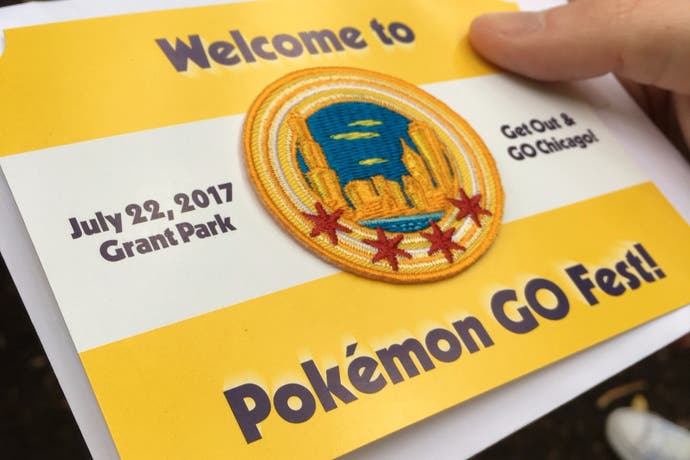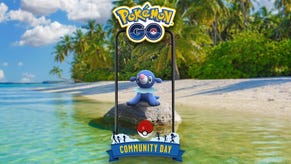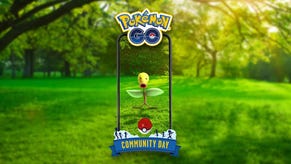How Pok¨¦mon Go's disastrous first fan gathering undid months of goodwill
And how Niantic tried to pull it back.
It was all going so well. After a shaky launch amid the genuine fever of last summer, Pokémon Go was riding high with a successful string of updates; a new generation of creatures, an effective rework of gyms that encouraged players back out into the open, and a regular stream of activities to make more unusual creatures easier to find. With a generally smoother connection experience compared to launch, Pokémon Go has begun living up to its vast potential and fans, generally, had never been happier with developer Niantic.
The game's inaugural anniversary event, Pokémon Go Fest, should have been a celebration of this rollercoaster first year, the final sign Niantic had set its house in order. Paying attendees (up to 20,000 were said to be allowed in Chicago's Grant Park) would work together with players around the world on unique challenges, find special creatures, and finally unlock perhaps the game's most requested feature to date, the ability to catch Legendary Pokémon - the perfect first birthday present for fans. Alas - it was not to be.
The day started well. The thunderstorms and rain originally forecast were nowhere to be seen. Warm blue skies highlighted the Chicago skyline as it towered over all that Niantic had put together. Arriving at the park enclosure that morning I was offered some neat surprises - a physical gym badge for fans to take away, the debut of an exciting event log-in mechanic involving spinning an in-game PokéStop checkpoint and scanning a QR code (okay, for Pokémon Go nerds like myself it was exciting) and the welcome sight of Pokémon I'd never caught before.
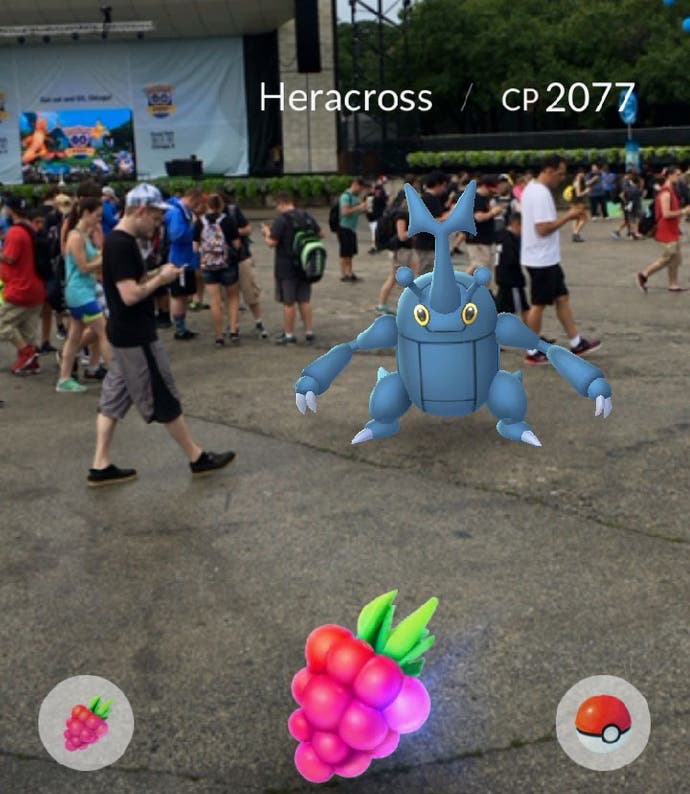
Within moments of arriving, early attendees were swarming around an Unown spawn, followed by a Heracross close by. Excitement rippled through the crowds, passing on word of what they've just seen, then dancing with delight as they caught two of the game's more elusive creatures with ease. It was already a good morning to be a Pokémon Go player.
After a quick lap of the park - dropping into colourful tents dedicated to the game's three rival teams, each kitted out with charging pods and refreshments for players seeking refuge from the heat, as well as spotting a Pikachu photo stand and corporate sponsor kiosks already attracting long queues with giveaways - my phone's connection started to wobble.
I attempted to buy a couple of incubators from the in-game shop (which allow you to hatch Pokémon eggs by walking set distances). Repeated failed server attempts meant I accidently bought six. It's fine, I thought - I'll easily make use of them today anyway. But within half an hour, as the crowds swelled before the opening ceremony, I struggled to log into the game. By the time proceedings officially kicked off and were being streamed on Twitch to fans around the world, I couldn't even get a phone signal - and nor could anyone else. I struggled to send simple SMS messages (remember those?) to keep the team back home abreast of what was happening. For an event entirely dependent on everyone having an internet connection, it was nothing short of a catastrophe.
Within the 90 minutes from early doors to the opening ceremony, the mood had turned sour. Though Niantic were quick to assure crowds they were looking into the connection issues, it wasn't enough. CEO John Hanke was booed as he walked on stage, while brash heckles and chants of 'fix our game' rang out as bubbly presenters did their best to keep the show going. It was uncomfortable viewing, and later scenes were uglier still. A water bottle was thrown at one of the on-stage presenters - the unwelcome outcome of a disappointed few's emotions boiling over. These sparks of frustration were fleeting but keenly felt, and something you wouldn't expect at a family-friendly gathering with young children in attendance.
Exploring the park during the first challenges - scheduled segments of high intensity play to catch specific types of creatures - was a more sedate, sombre affair. Attendees shuffled around the park in dismay, trying to find what signal they could. It wasn't a total blackout - some people managed to log on, and later I connected for a solid 25 minute window to check into some gyms and catch a solitary Magikarp (it was progress!) - but a far cry from the frenzy which was promised.
The day was starting to unravel, and perhaps true to form, Niantic was slow to react. The developer repeatedly stated it was working on the issues but pressed on with the day's activities regardless. What exactly was being done to fix things was unknown - I overheard a member of staff telling attendees it was busy calling cell providers to help with coverage - but despite the problems, somehow, the in-game challenges were being completed. (One image posted to Reddit appears to show the event's catch goals being changed on the fly - though you'd suspect with the reveal of Legendaries on the line, Niantic would ensure they'd pass no matter what anyway.)
The event itself was reasonably well organised. There were some issues, certainly - notably, the queues to get in which continued long after the event opened. The merch wasn't anything to write home about and despite the visible numbers of staff, communication beyond the main stage was sparse. But Grant Park was spacious enough to avoid crowds, and the play area had enough attractions to keep you busy, with refreshments and places of respite at hand. People were still trying to make the most of the day - it helped that the lunchtime timing of the challenges gave everyone an excuse to down tools for a while, and attendees kept their spirits high with their own entertainment.
I spotted a group playing volleyball with a giant inflatable Pokéball a stone's throw from the main stage, a parent and child taking a nap in a makeshift hammock between two trees, and young kids going analogue to catch real life Pokémon in some dirt under a hedge. Other players were simply striking up conversation in the shared misery of the day and making new friends in the process. Seeing this passionate community of one of the world's biggest games in person - families kitted out in Pokémon garb, clever pun-laden T-shirts, Team Rocket cosplay, the striking and fervent support to their chosen teams - was an attraction in itself, despite the circumstances.
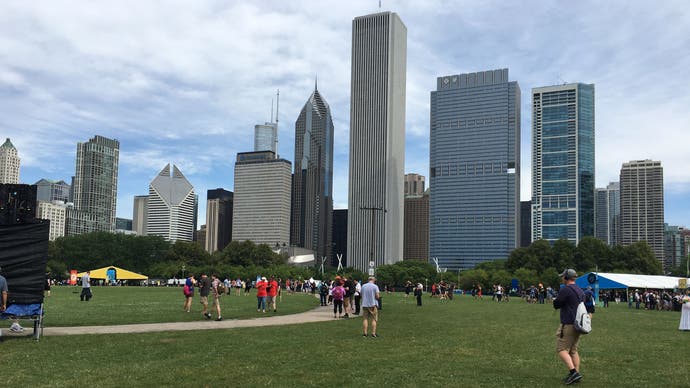
But anyone who played Pokémon Go during the game's shaky launch knows that connection issues drain your mood as well as your phone's battery, and by mid-afternoon the continued outages were exhausting. So when Niantic came on stage to announce it would take action - that there would be refunds and compensation, and later Legendary Pokémon would be rolling out in the next 48 hours without a fight - the mood in the crowd was more of palpable relief than disappointment.
In a bid to make amends - and ensure sure everyone could log in and receive their rewards - Niantic extended the event radius and its special Pokémon spawns to neighbouring parts of the city for the rest of the weekend. Buoyed by the news, and slowly recovering phone signal, attendees spilled out into adjacent parks in search of creatures and finally got what they came for. A Chansey here, a Porygon there, the hearsay of different Unown just round the corner. It took all day, but Niantic eventually found a way to give people a taste of what they came for.
And then, to everyone's surprise, special raids appeared throughout the city. These encounters allowed Legendary Pokémon to be caught for the very first time, and while it was swiftly rolled out to players worldwide, Chicago attendees enjoyed 100 per cent capture rates on every one (the norm is a reportedly staggeringly low 2 per cent) - making these exceptionally powerful creatures easy prey.
In scenes mimicking the frenzy of last summer, people sprinted down streets to make their catch, and packed onto sidewalks to visit virtual gyms, forcing traffic into the centre of the road. Whether planned from the outset or a hastily added make-good, the huge crowds and a backdrop of a setting sun created a spontaneous carnival atmosphere. Connection problems were still ripe, but with persistence you could play. People were catching Pokémon - and what Pokémon they were! This is what Pokémon Go Fest should have been.
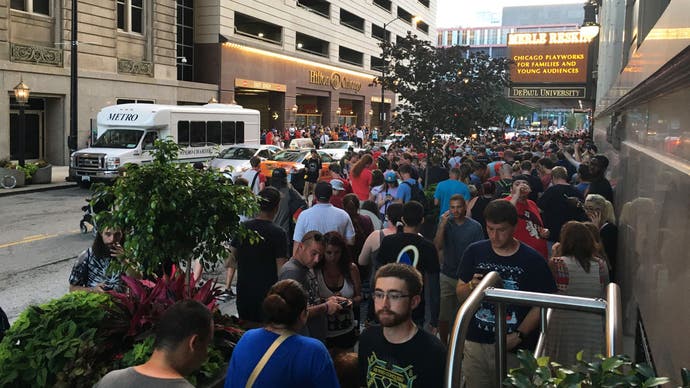
The unprecedented raid encounters carried over to the next day, but so did the connection issues. I burnt a handful of premium raid passes at tourists hotspots, and only saw real success at tucked-away gyms in the early hours of the morning - but it meant most could at least walk away with something special before they left town. It was far from an ideal end - having the app crash when these powerful creatures were just one swipe of a Pokéball away was very frustrating - but it became a hail mary to stop the festival from becoming a complete disaster. Still, judging by the jubilation of people catching Legendaries and other rare creatures for the first time, it was a move that may just have worked.
There's a bigger picture here, though - one also felt by those playing across the world. By focusing on an event attended by only a hardcore contingent of its playerbase, Niantic had raised the stakes so high that everything had to go flawlessly. When it didn't, goodwill built up over the past few months was undone. It was devastating for fans who placed their trust in Niantic planning a competent event, and a testament to those players who did not let the circumstances ruin their day.
Despite the odds, I'm sure people had some positive memories to take home with them from whatever far flung regions they came from - I know I did - and the highs of those early morning and evening skirmishes showed a real potential for future events to work. But Niantic needs to have serious rethink about how it approaches its future gatherings, and I'd have serious misgivings about spending time or money on whatever comes next. Like the game's launch, Pokémon Go's first attempt at a fan gathering felt like a poorly thought out beta - and its most dedicated fans paid the price.
This article is based on a press trip to Chicago. Niantic covered travel and accommodation costs.
